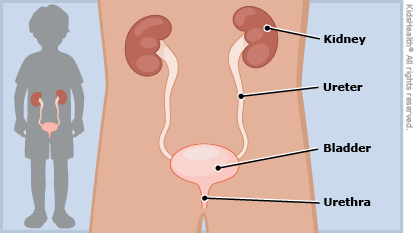Blood in the Urine (Hematuria)
Article Translations: (Spanish)
What Is Hematuria?
When blood gets into urine (pee), it's called hematuria (hee-ma-TUR-ee-uh). It's pretty common and usually not serious. There are two types of hematuria:
- Microscopic hematuria is when blood in the urine can be seen only with a microscope. Often, this goes away without causing any problems. In fact, people might never know they have it unless they get a urine test.
- Gross hematuria is when you can see the blood in the pee even without a microscope. This is because there is enough blood in the pee to turn it red or tea-colored.
How Does Blood Get Into the Urine?
Blood leaks into the urinary tract. This can happen anywhere in the urinary tract such as:
- in the kidneys, which remove waste and water from the blood to make pee
- in the ureters, which are tubes that carry pee from the kidneys to the bladder
- in the bladder, which stores pee
- in the urethra, where pee leaves the body
What Causes Hematuria?
Kids can get hematuria for many reasons. Common causes include:
- bladder or kidney infections
- kidney stones
- high levels of calcium and other minerals in the urine
- a problem with the urinary tract
- injury to the kidneys or urinary tract
- taking some types of medicines, like some over-the-counter pain medicines
- strenuous exercise (many athletes, especially distance runners, get hematuria from time to time)
In rare cases, hematuria can be a sign of kidney cancer or bladder cancer, a blood disease, or a blood clot. If something like that is going on, hematuria usually will be one of many symptoms.

Sometimes what looks like hematuria might be something else. Things like food dye, some foods (like beets or blackberries), a girl's monthly period (menstruation), and some prescription medicines can make pee look red.
What Are the Signs & Symptoms of Hematuria?
Microscopic hematuria has no visible signs. Doctors will only know someone has it if a urine test finds it.
Gross hematuria is seen because it changes the color of urine, which can happen with only a little bit of blood. Often, red or tea-colored urine is the only symptom.
In some cases, hematuria can be one of many symptoms of another condition. For example, if a bladder infection is causing the hematuria, other symptoms might include fever, pain while peeing, and lower belly pain.
How Is Hematuria Diagnosed?
The doctor will do an exam and ask about symptoms, recent activities, and the family medical history. Your child will give a urine sample (pee in a cup) for testing.
Sometimes, more tests are done, such as a:
- blood test
- urine culture
- kidney ultrasound
- MRI
- CT scan
Kids with hematuria that doesn't go away, who have protein in the urine, and/or high blood pressure should see a nephrologist (a doctor who specializes in kidney care).
How Is Hematuria Treated?
Most of the time, hematuria doesn't need any treatment. If it only happens once, it's nothing to worry about.
If another condition is causing the hematuria, doctors will treat that condition. For instance, hematuria from a urinary tract infection (UTI) is treated with antibiotics.
If your child was treated for hematuria, the doctor probably will do follow-up tests to make sure there's no more blood in the urine.
Note: All information is for educational purposes only. For specific medical advice, diagnoses, and treatment, consult your doctor.
© 1995-2024 KidsHealth ® All rights reserved. Images provided by iStock, Getty Images, Corbis, Veer, Science Photo Library, Science Source Images, Shutterstock, and Clipart.com

